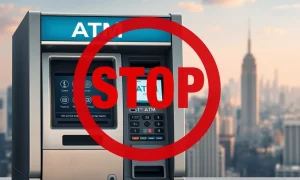A significant shift is underway in the financial world. US President Donald Trump is set to sign a crucial executive order. This order targets what is known as debanking. It aims to penalize financial institutions that deny services for ideological reasons. This move holds immense implications for businesses, particularly those in the cryptocurrency sector.
Understanding the Threat of Debanking
Debanking refers to the practice where banks deny or terminate services to individuals or businesses. Often, these actions are not based on financial risk. Instead, they stem from ideological or political reasons. This practice has raised concerns across various industries. For instance, gun manufacturers and fossil fuel companies have long reported being victims of debanking. They claim their access to essential banking services was unfairly restricted. Such actions limit their ability to operate effectively.
The cryptocurrency industry also faced significant challenges. Many crypto companies reported difficulties in securing banking relationships. They often struggled to open or maintain bank accounts. This made it hard to conduct daily operations. It also hindered their growth and innovation. Critics argued that these denials were not always based on legitimate financial concerns. Instead, they suspected a broader effort to limit the nascent crypto market’s expansion.
Operation ChokePoint 2.0: A Controversial Past
During the administration of former President Joe Biden, allegations surfaced regarding an initiative dubbed “Operation ChokePoint 2.0.” Many in the crypto community believed this was a deliberate attempt to stifle the digital asset industry. They felt it aimed to push crypto businesses offshore. This alleged initiative supposedly pressured banks to sever ties with certain high-risk sectors. Crypto businesses often fell into this category. Consequently, this period saw increased instances of debanking within the crypto space. This created a hostile environment for digital asset firms operating in the US. Despite the change in presidential administration, concerns about debanking have persisted.
Trump’s Executive Order: Key Directives Against Debanking
President Trump’s upcoming executive order directly addresses these persistent concerns. The order instructs federal bank regulators to identify and fine financial institutions. These institutions would be penalized for engaging in unlawful debanking. This proactive approach aims to protect businesses from unfair service denials. According to Bloomberg, citing a senior White House official, the directives are clear.
Specifically, the order outlines several key actions:
- Review of Complaint Data: Regulators will scrutinize existing complaint data. This helps identify patterns of alleged debanking practices.
- Client Reinstatement Efforts: Financial institutions under the Small Business Administration’s purview must work to reinstate clients. These are clients who were unlawfully denied banking services.
- Elimination of ‘Reputational Risk’: The executive order will instruct regulators to remove the ‘reputational risk’ category. This category will be purged from guidance and training materials. Critics widely argue that this category was used unfairly. It often targeted legitimate businesses, including crypto companies, based on perceived risks rather than actual financial concerns.
This removal signifies a major shift. It suggests a more lenient stance towards industries previously deemed ‘risky’ by traditional banking standards. Ultimately, the order seeks to foster a fairer banking environment for all businesses.
Traditional Banks Resist: Blocking Crypto Bank Applications
As the Trump administration moves to curb debanking, a powerful counter-movement is emerging. A group of influential bank associations is actively trying to block various crypto companies from obtaining banking licenses. This highlights the growing tension between traditional finance and the digital asset sector. These associations sent a letter to the Office of the Comptroller of the Currency (OCC) on July 17. The signatories included:
- The American Banking Association
- Consumer Bankers Association
- National Bankers Association
- America’s Credit Unions
- Independent Community Bankers of America
These groups seek to prevent four digital asset providers from securing banking applications. Notable firms like Ripple and Fidelity are among those targeted. Their collective action underscores a deep-seated apprehension within the traditional banking sector regarding crypto’s integration into mainstream finance.

Letter from banking associations to OCC. Source: ABA
In their letter, the associations raised significant concerns. They argued that the applicants’ proposed business plans might not involve typical fiduciary activities. These activities are usually performed by national trust banks. Furthermore, they claimed that the public portions of the applications lacked sufficient detail. This, they asserted, prevented meaningful public scrutiny. Their opposition suggests a desire to maintain the existing financial ecosystem. They seem hesitant to welcome new digital asset players into their regulated space.
Crypto Firms Eyeing Banking Licenses: Ripple and Circle’s Moves
Despite resistance, major crypto firms are pushing for deeper integration into the financial system. Ripple, the company behind XRP (XRP), submitted its banking license application on July 2. This move signals Ripple’s ambition to expand its financial services offerings. It aims to bridge traditional finance with blockchain technology. Days before Ripple’s application, Circle also made a significant filing. Circle, the creator of the USDC (USDC) stablecoin, applied to establish a national trust bank. This bank would manage its stablecoin reserves. Such applications highlight a clear trend. Crypto firms are increasingly seeking formal recognition and regulatory clarity. They aim to operate more directly within the established financial framework.
These applications underscore a growing overlap between traditional financial institutions and native crypto firms. This trend is intensifying competition across the financial services industry. Stablecoin companies, in particular, are introducing new forms of payments. These innovations may challenge the existing infrastructure provided by traditional banks and credit card companies. The landscape of financial services is rapidly evolving. Both traditional players and crypto innovators are vying for market share. Ultimately, this competition could drive significant changes in how financial services are delivered globally.
The Regulatory Landscape and Future Outlook for Debanking
The legislative environment is also adapting to these changes. The GENIUS Act, a US bill designed to regulate stablecoins and their issuers, was signed into law on July 18. This legislation provides a framework for stablecoin operations. It aims to bring more clarity and stability to this rapidly growing segment of the crypto market. Such regulatory developments are crucial. They provide a foundation for crypto firms to operate with greater certainty. They also help to address concerns from traditional financial institutions.
President Trump’s executive order on debanking represents a significant policy shift. It aims to foster a more inclusive banking environment. This directly benefits industries previously marginalized, including crypto. However, the resistance from established bank associations shows the ongoing friction. The financial sector is undergoing a profound transformation. This includes efforts to curb unfair debanking practices. It also involves the increasing mainstream acceptance and regulation of digital assets. The interplay between these forces will shape the future of finance for years to come.
Frequently Asked Questions (FAQs)
What is debanking?
Debanking is when financial institutions deny or terminate services to individuals or businesses. This often occurs for reasons beyond financial risk, such as ideological or political differences.
Why is debanking a concern for crypto companies?
Crypto companies have historically faced significant challenges in obtaining and maintaining banking services. This is often due to perceived ‘reputational risk’ or regulatory uncertainty, making it difficult for them to operate.
What is the purpose of Trump’s executive order on debanking?
The executive order aims to identify and penalize financial institutions that engage in unlawful debanking. It also seeks to eliminate the ‘reputational risk’ category from regulatory guidance, which critics say unfairly targeted certain industries like crypto.
What is ‘Operation ChokePoint 2.0’?
‘Operation ChokePoint 2.0’ is an alleged initiative from the previous administration. It purportedly pressured banks to sever ties with certain ‘high-risk’ sectors, including crypto businesses, aiming to drive them offshore.
How are traditional banks reacting to crypto companies seeking banking licenses?
A group of powerful bank associations is actively trying to block crypto companies like Ripple and Fidelity from obtaining banking licenses. They cite concerns about policy, legal questions, and insufficient public scrutiny of these applications.
What is the GENIUS Act?
The GENIUS Act is a US bill signed into law on July 18. It provides a regulatory framework for stablecoins and their issuers, aiming to bring more clarity and stability to this segment of the digital asset market.
























